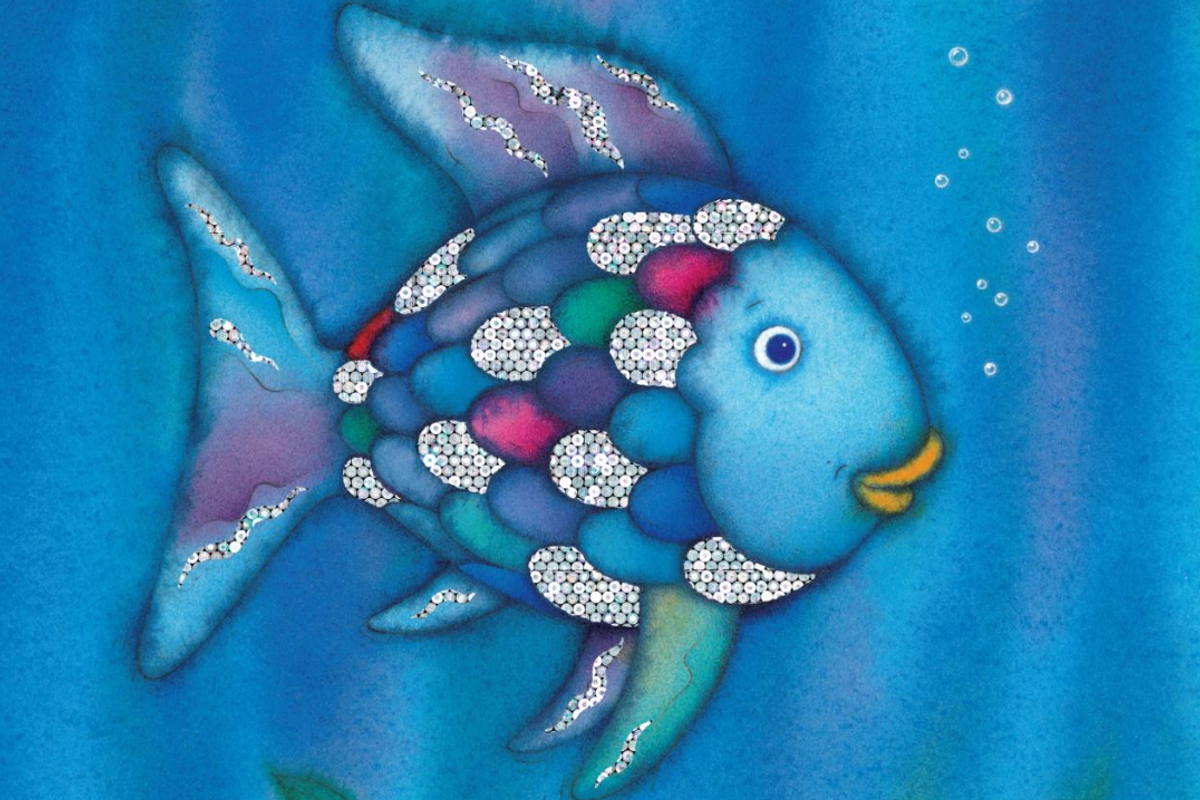Teacher explains why he doesn't like the classic kid's book 'Rainbow Fish'
The story loved by millennials everywhere might have a flawed message.
If all you remember of "Rainbow Fish" were those holographic scales, you're not alone.
Few children’s books are as deeply ingrained into the collective millennial psyche as “Rainbow Fish.” After all, what’s not to love about those oh-so sparkling rainbow scales and heartwarming lesson about how sharing leads to happiness far better than selfishness will. Only, according to some…that’s not the story’s lesson.
In a video posted to his TikTok, Fifth-grade teacher Mr. Vương admitted that while the illustrations were, in fact, great, and the author probably had “good intentions, he still “didn’t like” the story behind this award-winning classic.
For those who never read the book, or perhaps forgotten, Vương explains that at the beginning, “Rainbow Fish is full of himself because when all the other fish wanted to play with him, he sort of swam past them and thought he was better. Then one of the fish asked for one of his scales and he refuses.”
This is where Vương feels the book missed the mark, since the book depicts drawing a boundary to be Rainbow Fish’s character flaw (more on that later).
“In my opinion, I think he has the right to do that because he doesn't have to give up part of himself or anybody,” Vương.
The real flaw, Vương argues, “was that he was not humble.”
@teamvuong Poor Rainbow Fish. #teachersoftiktok #teachersfollowteachers #teachertok #literacy #therainbowfish #readaloud
Vương goes on to say that in the book, when Rainbow Fish said no, all the other fish decided not to play with him, which “made it more about how all the fish didn't accept him because he didn't give up his scales rather than them responding to his stuck-up behavior.”
Also in the book—the wise Octopus advises that Rainbow Fish overcome his pride and give up all but one of his scales to the other fish. He might no longer be the most beautiful fish in the sea, but he is finally happy. Thus bringing in the moral of the story of sacrificing vanity for peace.
“So he got acceptance…when he gave up parts of who he was…” Vương declares matter-of-factly.
Vương’s hot take seemed to resonate with a few other adults who thought the Rainbow Fish had lost its luster over time.
““Rereading it as an adult now, it made me angry. Little fish has the audacity to ask for a shiny scale, Rainbow Fish says no, so little fish goes and bad mouths him to all the other fish so they all turn on him and only become his friends when he gives up a part of himself,” one viewer wrote.
“I feel like the book had more of a ‘sharing is caring’ moral and just carried out the message in a weird way with the scales” another said.
One person even quipped, “…and now I know where I learned to be a people pleaser from. Thanks FYP.”
But still…the holographics scales are pretty neat…right? *cries in millennial*
It’s worth noting that regardless of his own personal opinion of the book, Mr. Vương still uses it to “teach about how to think critically about themes.”
“I opened up with what the theme was and then I read the story without telling them my opinion,” he says. “Then the kids made all these connections themselves and some of them looked at it through the lens of, ‘Oh it's selfishness.’ And some of them were like, ‘Wait, is he buying his friends?’”
Not only that, but the class had “really good discussions” about transactional relationships, as well as dissecting what the author's original intent might have been. They will also be creating their own alternate endings, “where the theme is not that you gotta, you know, pay for your friends,” as the last part of their assignment.
While not everyone might share Vương’s opinions on this kid’s book, we can probably all agree on his stance that “just because it has an award-winning sticker on it, it does not make it top-notch.”
This article originally appeared last year.

